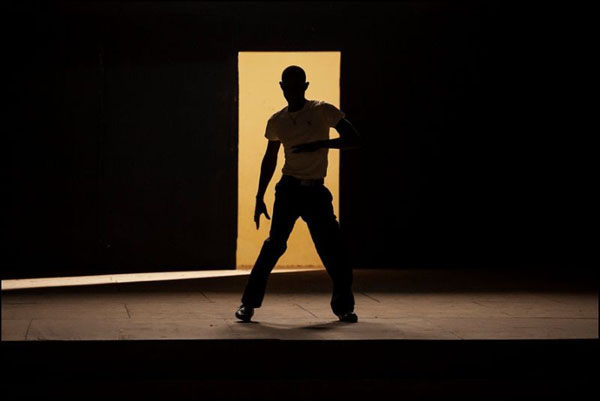With Grigris, Mahamat Saleh-Haroun “revisits that theme of father-son bonding which was such an important part of his earlier movies Our Father (2002), Dry Season (2006) and A Screaming Man (2010),” writes the Guardian‘s Peter Bradshaw. “But now he progresses away from this template—in the same meandering way that characterizes his storytelling—to a closer identification with women. It is a typically calm, lucid drama, presented in the director’s unforced, cinematic vernacular and attractively and sympathetically acted. There is also some great music from the Senegalese composer Wasis Diop, brother of the director Djibril Diop Mambety. However, I couldn’t help feeling that this was a slight and contrived piece, compared to his earlier work.”
Barbara Scharres sets it up at RogerEbert.com: “Grisgris (Souleymane Deme) dances in a small-town nightclub, his slight body shimmying and undulating like smoke until fans chanting his name stuff cash under his shirt collar. Out on the street, he’s an object of pity: a young man with a deformed hip and a dead leg, who walks in a bobbing crab-like gait. At home, he’s Souleymane, who helps his stepfather in his hole-in-the wall photo shop. A family crisis creates the need for more money than Grisgris has ever seen, and he pleads with the local gangster, a smuggler of black-market gasoline, for a job. There’s a girl, Mimi (Anais Monory). She’s the kind of impossibly beautiful woman who would be assumed to be out of his reach, but she warms up to his kindness. He’s the last one to know she’s a hooker. Dangerously, Grisgris cheats his boss [Moussa, played by Cyril Guei] for a chance at more money and a different life.”
It’s all “considerably leaner than its melodramatic premise might suggest,” writes Guy Lodge for Variety. “Souleymane may be the more vulnerable figure, but he’s so gormlessly impassive that we have only a semi-rooting interest in watching him escape Moussa’s clutches. Mimi, too, isn’t defined much beyond the social drawbacks of her skin and her profession. The film’s interest in their relationship seems primarily political rather than romantic: an illustration of how even the most disadvantaged societies create their own untouchables.”
“Strip away the African context and Grigris is a socially conscious morality play in a grand European tradition stretching back through the Dardennes and Ken Loach to the Italian neorealist movement,” suggests Stephen Dalton in the Hollywood Reporter. “The characters feel archetypal, almost pulpy: the penniless outsider on a mission, the whore with the heart of gold, the charming but deadly gangster. But this over-familiarity is leavened for non-African viewers by the exotic prospect of seeing Chad on screen. Although Haroun’s shooting style is fairly conventional, he frames some lovely images here. The sequence in which Moussa’s gang of gasoline smugglers wade through a watery labyrinth of tunnels, silhouetted in chemical orange and sickly green, has a hellish kind of beauty.”
“Haroun’s new film is not much of a credit to the African art cinema tradition of Ousmane Sembene and Djibril Diop Mambéty,” grumbles Dan Fainaru in Screen. “Once his casting was sorted, Haroun… perhaps decided to rest on his laurels and left his two leads… to fend for their lives in a plot that doesn’t hold much water or makes much sense.”
“A straightforward tale of overcoming personal and professional challenges with no fancy dressing, Grigris goes down easy but offers nothing remotely fresh,” writes Indiewire‘s Eric Kohn.
“Grisgris is a balance between a sometimes fascinating realism and slightly less convincing elements of fiction,” finds Fabien Lemercier at Cineuropa.
Update, 5/24: “Maybe it’s still possible to do something interesting with such tired storylines at this late date,” writes Mike D’Angelo at the AV Club, “but Haroun treats them as if they’ve never been dramatized before—not in any self-aware, visionary sense, but with the obliviousness of someone who simply doesn’t know that he’s re-enacting clichés. Thankfully, his eye for vivid imagery remains intact.”
Update, 5/27: “Grigris is a film of communities in contrast,” writes Glenn Heath Jr. at Little White Lies. “How people identify themselves within a given social space is paramount to the director’s overt thematic interests involving family and region. But Haroun’s straightforward approach is surprisingly simplistic when compared to his nuanced direction of 2010’s A Screaming Man. With Grigris, he relies heavily on the character’s cliché external conflicts to convey a thinly explored ideology that gratuitously favors country living over urban existence.”
“Unfortunately, Haroun can’t quite turn Démé from a dancer to a convincing leading man,” writes the Playlist‘s Kevin Jagernauth, “and certainly not when given little to work with. Grigris measures out its story in spacious doses, hoping to build into something of a morality tale, but there is little learned except that entering a criminal enterprise and trying to outsmart the criminals probably isn’t a great idea.”
Cannes 2013 Index. And you can watch over 100 films that have seen their premieres in Cannes right here on Fandor. For news and tips throughout the day every day, follow @KeyframeDaily on Twitter and/or the RSS feed. Get Keyframe Daily in your inbox by signing in at fandor.com/daily.





